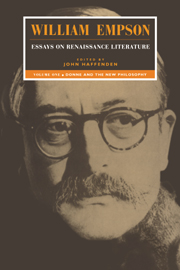Book contents
- Frontmatter
- Contents
- Preface
- Sources and acknowledgements
- Introduction by John Haffenden
- 1 Donne and the rhetorical tradition
- 2 Donne the space man
- 3 Donne in the new edition
- 4 Rescuing Donne
- 5 Donne's foresight
- 6 Copernicanism and the censor
- 7 Thomas Digges his infinite universe
- 8 Godwin's voyage to the moon
- Appendix on Galileo
- Notes
- Index
1 - Donne and the rhetorical tradition
Published online by Cambridge University Press: 01 February 2010
- Frontmatter
- Contents
- Preface
- Sources and acknowledgements
- Introduction by John Haffenden
- 1 Donne and the rhetorical tradition
- 2 Donne the space man
- 3 Donne in the new edition
- 4 Rescuing Donne
- 5 Donne's foresight
- 6 Copernicanism and the censor
- 7 Thomas Digges his infinite universe
- 8 Godwin's voyage to the moon
- Appendix on Galileo
- Notes
- Index
Summary
I can't offer any new view of Donne, that is, my opinions however unacceptable have appeared in book form already; but I have been reading some of the recent learned works about the Elizabethan rhetoric teaching and its influence on the poets, and I feel something needs to be said about them. I shall mainly be concerned with Miss Rosemond Tuve's massive study Elizabethan and Metaphysical Imagery. I also read William Shakespeare's Small Latine and Lesse Greeke by T. W. Baldwin (2 vols.; Urbana, 111.: 1944) and Shakespeare's Use of the Arts of Language by Sister Miriam Joseph (comforting things to have in bed with one while the guns fired over Peking) and such is the extent of my erudition on the matter.
Of course, in a broad way, these authors are quite right; the rhetoric training did have a great effect on any poet who had been through it, and even the assertively unlearned Shakespeare (the case seems pretty well proved) had been through it all in his grammar school. All the same, the new research does not seem much use in detail. The only important Shakespeare crux I can find Mr Baldwin trying to clear up is Hamlet's ‘Fix a comma twixt our amities’. He speaks triumphantly about this, and really does I think explain how it came to be written; and yet the only moral seems to be that Shakespeare's training led him for once into writing a bad line – bad now and bad then (maybe as an attempt to make Hamlet a bit of a university pedant it went over with the first audiences tolerably).
- Type
- Chapter
- Information
- William Empson: Essays on Renaissance Literature , pp. 63 - 77Publisher: Cambridge University PressPrint publication year: 1993



